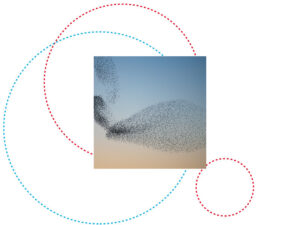An international team of scientists, including Professor Etienne Fodor, a theoretical physicist from the University of Luxembourg, have recently studied the thermodynamic cost in active field theories. The article published in the Physical Review X was produced in cooperation with researchers at the RICE University in Houston, the University of Cambridge, and the University of Durham.
While many active systems are biological —flocks of birds or swarms of bacteria—there is growing interest in synthetic ensembles of autonomous, self-propelled particles. However, the complicated energy exchanges and far-from-equilibrium dynamics in these systems makes them difficult to study. In particular, thermodynamics, which has played a pivotal role in many discoveries, cannot be used “as is” because it deals with systems at or close to equilibrium. Here, we extend the thermodynamic notion of heat to active materials and quantify the energetic cost of sustaining the active dynamics.

Most progress to date in building the thermodynamics of active materials has dealt with theoretical frameworks that treat the systems as collections of particles. Yet, for complex materials made of a large variety of active components, a phenomenological hydrodynamic description is often preferred. Here, the authors embed general active hydrodynamic theories within a thermodynamic framework. Using stochastic thermodynamics, which has been successful in providing a thermodynamic framework for particle-based active theories, they calculate the irreversibility of the active dynamics. By including the underlying driving mechanism, they derive the thermodynamic entropy production rate, which is associated with heat dissipation.
Their work provides the relevant framework to study how heat rate relates to emerging patterns at large scale and lays the groundwork to potentially bridge the gap between the thermodynamics at microscopic and hydrodynamic levels. The evaluation of heat dissipation at the hydrodynamic level allows quantification of the efficiency of active heat engines that utilize collective effects.
Etienne Fodor joined the University of Luxembourg in October 2020 as an ATTRACT Fellow funded, by the Fonds National de la Recherche (FNR) for the five-year project “Statistical Mechanics of Active Matter” and head the Physics of Active Matter Group within the Department of Physics and Materials Science (DPhyMS).
